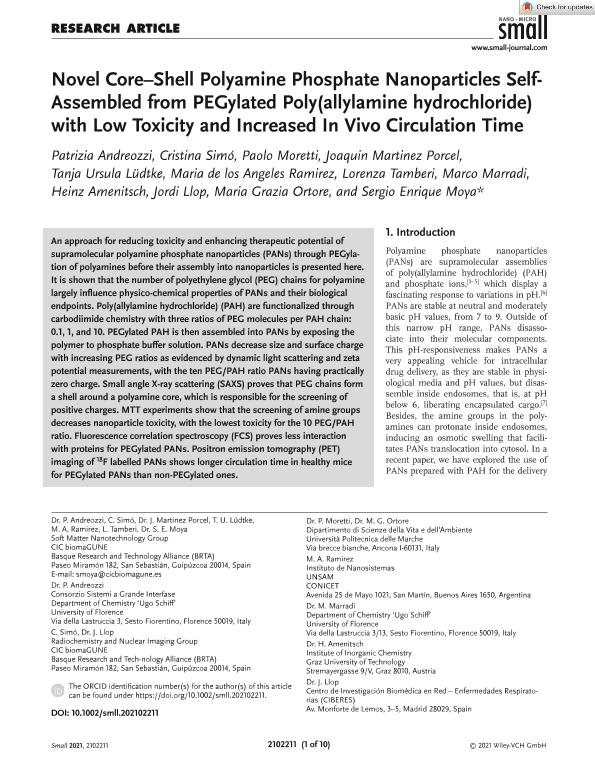Artículo
Novel Core–Shell Polyamine Phosphate Nanoparticles Self-Assembled from PEGylated Poly(allylamine hydrochloride) with Low Toxicity and Increased In Vivo Circulation Time
Andreozzi, Patrizia; Simó, Cristina; Moretti, Paolo; Martinez Porcel, Joaquin; Lüdtke, Tanja Ursula; Ramirez, Maria de Los Angeles ; Tamberi, Lorenza; Marradi, Marco; Amenitsch, Heinz; Llop, Jordi; Ortore, Maria Grazia; Moya, Sergio Enrique
; Tamberi, Lorenza; Marradi, Marco; Amenitsch, Heinz; Llop, Jordi; Ortore, Maria Grazia; Moya, Sergio Enrique
 ; Tamberi, Lorenza; Marradi, Marco; Amenitsch, Heinz; Llop, Jordi; Ortore, Maria Grazia; Moya, Sergio Enrique
; Tamberi, Lorenza; Marradi, Marco; Amenitsch, Heinz; Llop, Jordi; Ortore, Maria Grazia; Moya, Sergio Enrique
Fecha de publicación:
02/09/2021
Editorial:
Wiley VCH Verlag
Revista:
Small
ISSN:
1613-6810
e-ISSN:
1613-6829
Idioma:
Inglés
Tipo de recurso:
Artículo publicado
Clasificación temática:
Resumen
An approach for reducing toxicity and enhancing therapeutic potential of supramolecular polyamine phosphate nanoparticles (PANs) through PEGylation of polyamines before their assembly into nanoparticles is presented here. It is shown that the number of polyethylene glycol (PEG) chains for polyamine largely influence physico-chemical properties of PANs and their biological endpoints. Poly(allylamine hydrochloride) (PAH) are functionalized through carbodiimide chemistry with three ratios of PEG molecules per PAH chain: 0.1, 1, and 10. PEGylated PAH is then assembled into PANs by exposing the polymer to phosphate buffer solution. PANs decrease size and surface charge with increasing PEG ratios as evidenced by dynamic light scattering and zeta potential measurements, with the ten PEG/PAH ratio PANs having practically zero charge. Small angle X-ray scattering (SAXS) proves that PEG chains form a shell around a polyamine core, which is responsible for the screening of positive charges. MTT experiments show that the screening of amine groups decreases nanoparticle toxicity, with the lowest toxicity for the 10 PEG/PAH ratio. Fluorescence correlation spectroscopy (FCS) proves less interaction with proteins for PEGylated PANs. Positron emission tomography (PET) imaging of 18F labelled PANs shows longer circulation time in healthy mice for PEGylated PANs than non-PEGylated ones.
Archivos asociados
Licencia
Identificadores
Colecciones
Articulos(SEDE CENTRAL)
Articulos de SEDE CENTRAL
Articulos de SEDE CENTRAL
Citación
Andreozzi, Patrizia; Simó, Cristina; Moretti, Paolo; Martinez Porcel, Joaquin; Lüdtke, Tanja Ursula; et al.; Novel Core–Shell Polyamine Phosphate Nanoparticles Self-Assembled from PEGylated Poly(allylamine hydrochloride) with Low Toxicity and Increased In Vivo Circulation Time; Wiley VCH Verlag; Small; 17; 35; 2-9-2021; 1-10
Compartir
Altmétricas



